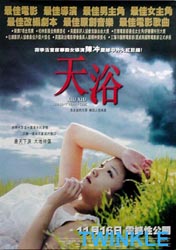Xiu Xiu – “The Sent – down Girl” (1998) -- More "Hong Kong" Cinema?
In Mandarin / English subtitles: Every once in a while one sees a film like this that jars a
few memories, of which those on the Cultural Revolution as seen by PRC
leadership maybe thirty five years later and with a ten – year past remembrance
of “Tian An.” The Cultural Revolution in
PRC and other Mao times showed the leadership goals and style of The Great
Helmsman who given what his internal policies were, what with his re –
education programs and the like in the mainland countryside, had probably had
it with people long before he assumed any political leadership whatsoever in
his country. One of the greatest
 |
| Media Image |
This outstanding 1998 Hollywood – style Chinese film depicts
the young life of Xiu – xiu (Lu lu,) from Cheng du, a very large city that has
a history as a capitol since medieval times, who is sent to the far provinces
in the tide of internal exiles of the Cultural Revolution in the custody of Wen
xiu (Lopsang) who husbands her through many trials, but cannot prevent the
eventualities the young one faces as an urban city person who is sent to live in
the far country and other provincial places, essentially on a cot in a
tent. The character played by Wen xiu is
remarkable in that many such people, probably indeed, had at least met the old Bolsheviks,
even Chairman Mao himself, and many knew him personally, and believed in Marxism
– Leninism and its Chinese variant with all themselves. Such people were many as Mao in his campaigns
was accessible to people, and these politics as appealing to all Chinese were
part of what enabled the communists to seize control of the country, presumably
over foreign parties and their interests, in 1949. The story is now familiar and old to many
people, and to anyone among the many who've traveled to PRC since it officially
opened for tourism in the 1970’s. The
film has the hard – hitting proportions of a Greek tragedy, and though people
like me have not any idea how it did at home, it illustrates the self –
destruction of the Cultural Revolution and the back – handed, if not mortal ways
in which the Chinese administration treated people (while depending greatly
upon PLA and other military resources), insiders and especially provincial
outsiders more severely, all at the same time as building and re – enforcing party
and other political affiliations. This
is part of the paradox of some orthodox Marxist systems and is illuminated
best, perhaps in the recalling of “Caligula” – type themes and images that
pervade this film, however tepid these are and apparently fundamentally gifted
and enlightened the characters appear as depicted. As the film progresses, the scenes become progressively
more poignant as Wen xiu at one point travels ten li to gather fresh water for
Xiu’s bath. There is also a scene at a
country medical clinic, if it can be called that, where Xiu is destroyed and Wen
reacts in recognition of negligent treatment and so forth by attacking her
assailants; these scenes are difficult to watch with respect to cinematic
milieu and the atavistic character of those characters in contrast and
opposition to Xiu and Wen. It is
surprising the censors under Deng Xiao – ping allowed the publication of this
film as it is controversial and undermining in many ways to communism and Marxist
ideas, apart from just the message it carries of the huge slap to Chinese society
during the years of the Cultural Revolution and even for many years
thereafter. It is possible that due to
the Asian financial crisis at the time and what happened with the Yuan and
other currencies, the leadership of the PRC was forced to recognize, as to
their merits the Paramount Leader and his associates at the time did, the
limits and critically damaging and many, many incalculably destructive
influences the Cultural Revolution and other very elaborate internal aims of
the PRC at the time had on people’s lives everywhere; especially on those
Chinese who were around, knew of it and even read up on it at the time while
overseas. Everyone needs view this piece or at least get to know its story or one like it.
No comments:
Post a Comment